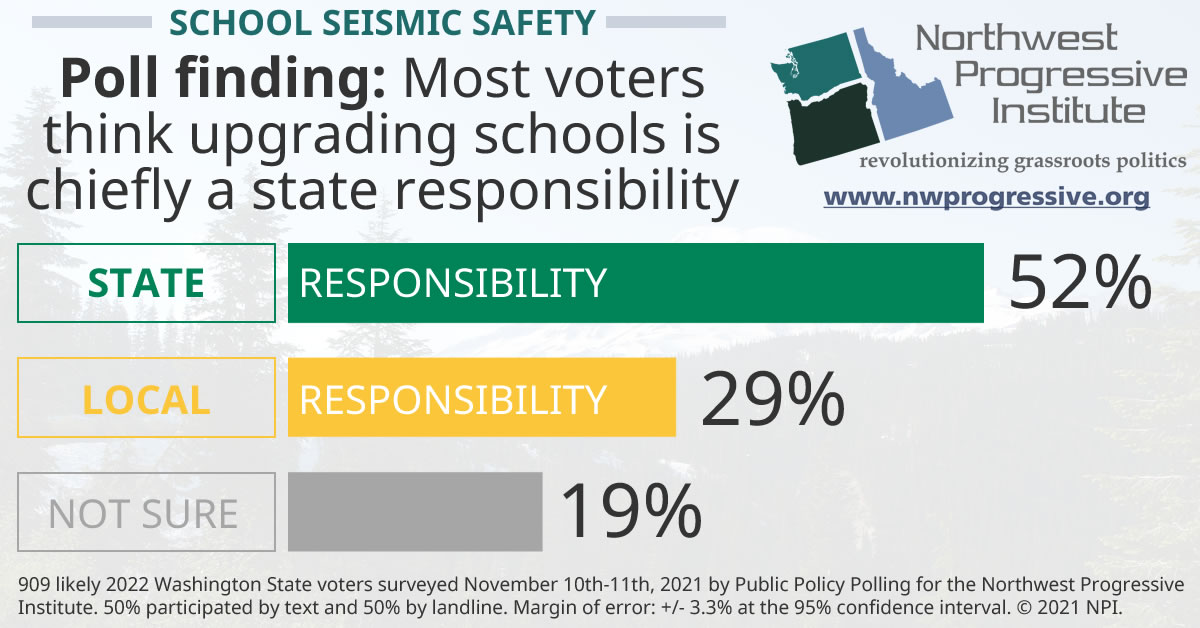A majority of likely 2022 Washington voters think that upgrading Washington’s seismically vulnerable school buildings is primarily a state responsibility that the Legislature should act on, as opposed to a local responsibility that should be left to school boards, NPI’s most recent statewide survey has found.
52% of 909 likely 2022 midterm voters interviewed by Public Policy Polling for the Northwest Progressive Institute said they think upgrading Washington’s seismically vulnerable school buildings should primarily be a state responsibility, paid for with state tax dollars appropriated by the Washington State Legislature.
29% of respondents said it should be a local responsibility, financed by bonds that require 60% affirmative support from voters at the request of local school boards.
19% were not sure.

The finding, unveiled by NPI at a public hearing in the Senate Ways & Means Committee this evening, affirms that voters see the Legislature as principally responsible for upholding the state’s paramount duty to “make ample provision” for the education of all of the state’s children, as the Framers of the Constitution intended when they wrote Washington’s plan of government.
For too long, the Legislature has failed to take decisive action to ensure Washington’s youth have safe school buildings to learn in.
But that could be about to change.
SB 5933, prime sponsored by Senator David Frockt (D‑46th District: Seattle) would create a school seismic safety grant program to facilitate the retrofitting or replacement of the state’s most decrepit and vulnerable school buildings. The program would be backed by $500 million of general obligation bonds issued by the state that would have to be approved by voters this November.
State Representative Gerry Pollet has introduced a companion bill in the House.
Frockt’s bill is notably cosponsored by three Republican senators: Mark Schoesler, the former minority leader, Jim Honeyford, and Jeff Wilson. All represent rural districts. Honeyford and Schoesler’s districts are east of the Cascades.
The bill is also supported by Superintendent of Public Instruction Chris Reykdal, the Washington State PTA, the Alliance of Educational Associations, the City of Seattle, the Department of Natural Resources, and former Republican State Representative Jim Buck, who joined NPI in providing testimony for the bill.
Happily, no one spoke against the bill during its public hearing or signed in against it. Sixty-seven individuals, many of them education advocates, signed in “pro” on the bill along with the seven speakers who testified in its favor.
Protecting youth, teachers, and school staff from geologic hazards by providing state funding to replace or repair seismically vulnerable buildings is one of NPI’s top ten legislative priorities for the 2022 session, which ends March 10th.
Passage of this legislation would be a huge win not only for Washington’s youth, teachers, and parents, but for all Washingtonians. If properly engineered to withstand severe geologic hazards, school buildings can pull double duty as emergency refuges and community organization and recovery centers.
Here’s the question we asked and the responses we received:
QUESTION: Many of Washington State’s 2,000 public schools operate out of buildings that are extremely vulnerable to geologic hazards like earthquakes, tsunamis, or lahars. A recent survey of five hundred and sixty-one school buildings conducted by the Department of Natural Resources for the Office of the Superintendent of Public Instruction found ninety three percent with structural safety sub-ratings of just one out of five stars. Do you think upgrading Washington’s seismically vulnerable school buildings should primarily be a state responsibility, paid for with state tax dollars appropriated by the Washington State Legislature, or should it be a local responsibility, financed by bonds that require 60% affirmative support from voters at the request of local school boards?
ANSWERS:
- Think upgrading Washington’s seismically vulnerable school buildings should primarily be a state responsibility: 52%
- Think it should be a local responsibility: 29%
- Not sure: 19%
Our survey of 909 likely 2022 Washington State voters was in the field from Wednesday, November 10th through Thursday, November 11th, 2021.
It utilizes a blended methodology, with automated phone calls to landlines (50%) and text message answers from cell phone only respondents (50%).
The poll was conducted by Public Policy Polling for the Northwest Progressive Institute and has a margin of error of +/- 3.3% at the 95% confidence interval.
More information about the survey’s methodology is available here.
When we looked at the responses by geographic location, we found that a majority or plurality say it’s primarily a state responsibility in every region.
| Region | State Responsibility | Local Responsibility |
| North Puget Sound | 62% | 28% |
| King County | 56% | 21% |
| South Sound | 54% | 39% |
| Olympic Peninsula and Southwest Washington | 47% | 29% |
| Eastern and Central Washington | 42% | 35% |
We know that geologic hazards like earthquakes, tsunamis, and lahars are a fact of life in our state. We know it’s a matter of when, not if.
And, as mentioned, we know that the Constitution says it is “the paramount duty” of the state — the state, not local school districts — to “make ample provision for the education of all children residing within its borders.”
Our kids require and deserve safe school buildings to learn in.
Senate Bill 5933 will allow us to make meaningful progress in upgrading our seismically vulnerable school buildings. It is absolutely imperative that this legislation be acted on by the Legislature this session.
NPI thanks the Senate Ways & Means Committee for hearing this bill and urges its swift passage. Readers, if you would like to join us in expressing support for the bill, you have until 4 PM Pacific tomorrow to submit written testimony here.

